How AI cold calling increases your pipeline: The guide to benefits, tools, and best practices

Principal Account Executive, Enterprise at Dialpad

Tags
Share
No matter how much of a bad rap cold calling has gotten in recent years, it’s always been a cornerstone strategy for many businesses across different industries.
That hasn’t changed today. The problem with traditional cold calling though, is it can be extremely time-consuming—and often yields not-great results. Sure, a sales rep might get one “yes” for every 100 “no”s, but that yes might be for a really small deal, and not worth the hours they spent.
This is where AI cold calling can help. By leveraging AI sales tools to improve the efficiency of your sales team’s cold calling workflows, you can help them shorten that timespan needed to get to a “yes.”
In this blog post, we’ll look at what AI cold calling is and how to use it to accelerate your sales cycle.
What is AI cold calling?
AI cold calling involves using artificial intelligence to automate different steps in the cold calling process such as logging data, dialing calls, and optimizing call strategies. The goal is to take manual tasks off of reps’ plates and make sales outreach more efficient and effective.
What are the key features of AI in cold calling?
AI cold calling integrates several different features to improve the traditional cold calling process:
Lead generation: AI can identify and prioritize high-potential leads, ensuring that sales teams focus their efforts on the most promising prospects.
Intent scoring: AI can also analyze customer data and behavior patterns to accurately assess a lead's likelihood of conversion, which helps reps prioritize those with the highest purchase intent.
Enhanced personalization: Need ideas for how to personalize messaging? AI can use customer data to recommend copy based on prospects’ preferences, behaviors, and needs.
Improved sales forecast accuracy: Finally, AI can examine historical data and identify patterns to predict future sales trends, providing more reliable and precise sales forecasts.
How does AI personalize cold calling?
AI can personalize cold calling by taking huge amounts of prospect and customer data, which it can then use to suggest tailored messaging for individual prospects based on their needs and pain points.
Whereas reps used to have to do hours of research for every prospect or business to get to this level of personalization, AI can speed up that process by taking a fraction of the time.
What are the AI technologies driving cold calling innovation?
Several AI technologies are at the forefront of cold calling innovation, including:
Natural Language Processing (NLP), which analyzes and generates human-like speech.
Machine Learning (ML), which enhances the system's ability to learn and become more accurate over time.
Predictive Analytics, which anticipates potential leads’ buying behaviors.
Speech Recognition, which transcribes and analyzes conversations to provide actionable insights.
What are the benefits of cold calling AI?
Increased sales team efficiency
Cold calling AI tools can automate repetitive tasks like manual dialing and follow-ups, saving time and resources.
More personalized experiences
AI can also tailor conversations to individual prospects based on past data, which improves engagement.
Detailed insights
With sales teams inundated by more data than ever before, AI cold calling tools are essential because they can analyze huge volumes of data in seconds, providing comprehensive insights into call performance and outcomes.
How does AI improve traditional calling methods?
AI enhances traditional calling methods by automating a variety of routine tasks. Reps don’t have to manually dial phone numbers anymore, managers can track performance in real time, and cold calling teams can focus their outreach on the best prospects who are most likely to buy.
How can AI cold calling contribute to sales pipeline growth?
AI cold calling can significantly contribute to sales pipeline growth by identifying high-quality leads, ensuring more consistent and personalized follow-ups, and freeing up more time for reps to focus on booking meetings and closing deals.
How to use AI for cold calling: 4 best practices and tips
Here are four AI best practices and cold calling tips:
1. Select the right tools
Start by defining your specific requirements. Do you need a tool that offers predictive analytics, speech recognition, or advanced CRM integration?
Once you’ve narrowed down your options, look into different AI cold calling tools on the market. Compare their features, user reviews, pricing, and integration capabilities.
Make sure to do a proof of concept to understand their usability and effectiveness in real-world scenarios.
2. Leverage AI for pre-call planning
Use AI to analyze historical data and customer interactions. This helps in understanding the prospect’s behavior, preferences, and pain points.
Here at Dialpad, for example, our team uses a tool called Poggio. It leverages AI to search the internet for all of the relevant research we'd want to know about a prospect.
You could also use AI to generate personalized call scripts, which ensures that your sales pitch is relevant and addresses your prospects’ specific needs.
3. Use to help reps on the call
AI can help reps directly on cold calls in many different ways.
For example, Dialpad Ai Sales has a real-time transcription feature that can take notes as the call is happening, which lets reps focus on persuading or closing the prospect instead of typing up notes.
Dialpad Ai can even summarize the call at the end in a neat recap with action items:
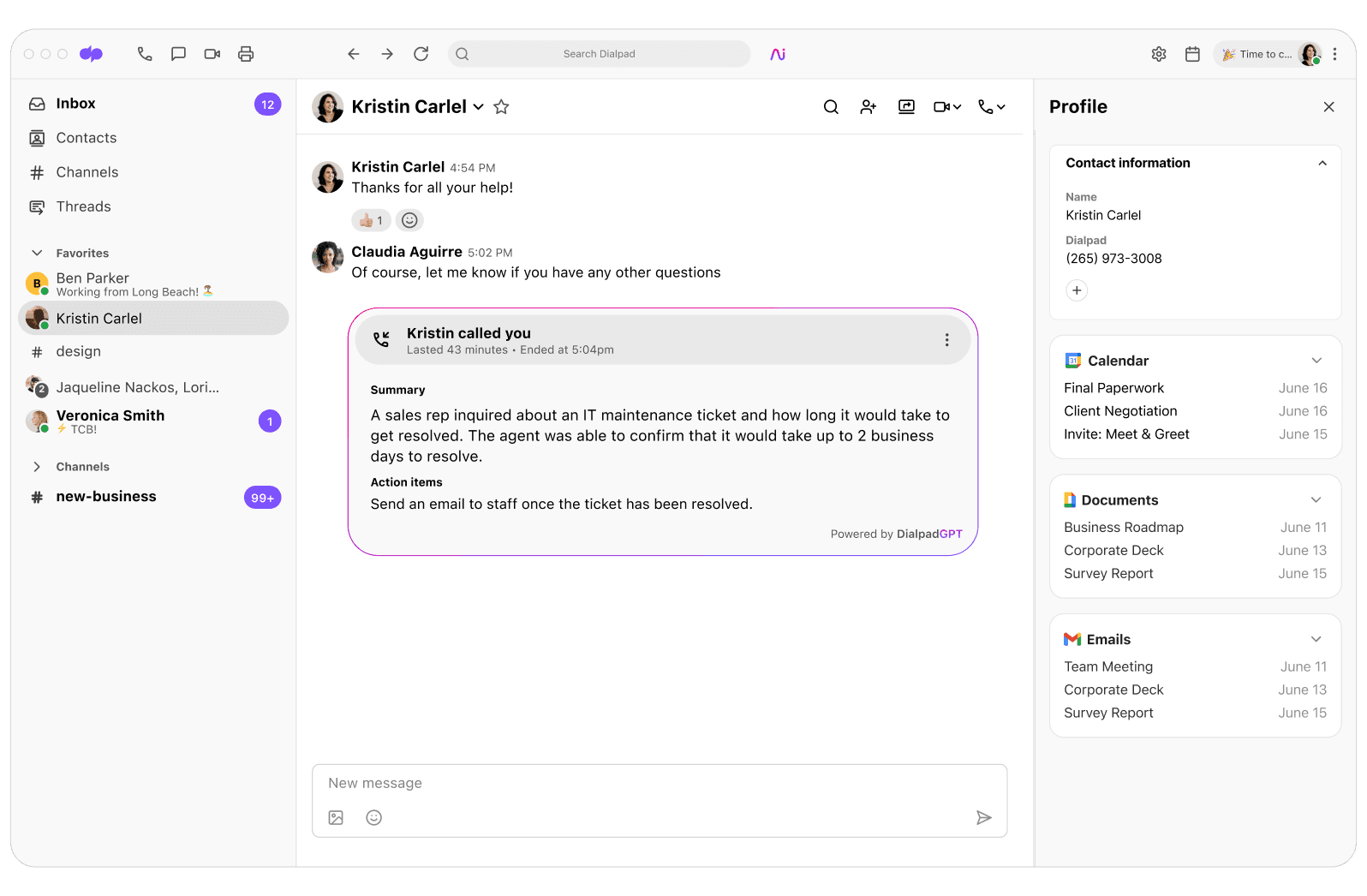
Cold calls are also some of the most challenging types of conversations a sales rep can have. As part of our training program, we use Dialpad’s Ai Playbooks to help reps easily see what they have to ask a prospect on a call—Dialpad Ai helpfully highlights questions that reps have to run through and automatically checks them off in real time:

4. Tailor your strategies using metrics and feedback
AI provides a wealth of qualitative and quantitative data that can help tailor and refine your cold calling strategies. Here are a few examples of metrics to consider using:
Call performance metrics: Analyze metrics such as call duration, engagement rate, and conversion rate to identify what’s working and where improvements are needed.
A/B testing: Conduct A/B tests on different call scripts, approaches, and timings.
Customer feedback analysis: Use AI to analyze customer feedback and sentiment from calls.
Top 9 best AI tools for cold calling
When it comes to cold calling tools, AI can help with many different steps and stages in the process. Most AI tools are designed to target a specific part of the cold calling process, like dialing or post-call conversational intelligence.
Here are 10 of the best AI tools for cold calling, with descriptions of what each one is designed to do.
1. Dialpad Ai Sales
Dialpad is arguably the top AI cold calling software on the market. It enables sales reps to make more calls faster with the Salesforce power dialer integration, and there are a ton of real-time coaching and conversational AI for cold calling features.
One huge benefit of Dialpad is its AI can transcribe cold calls in real time—not after the call:
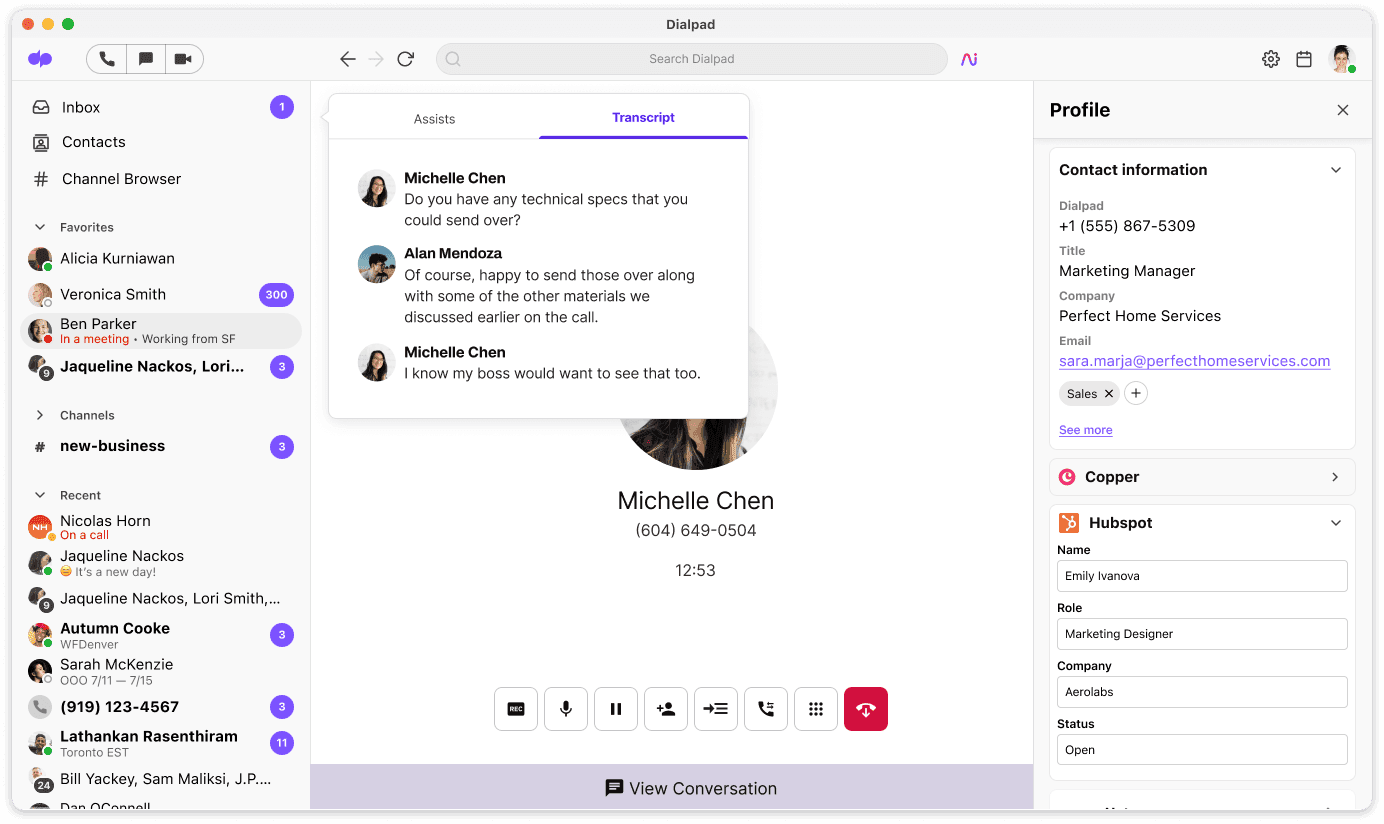
This means managers can see transcripts for every call that’s happening, get context immediately if someone needs help, and jump in. Dialpad Ai also summarizes every call into a recap that includes action items and time-stamped events, which is very helpful when we’re doing post-call reviews:

On top of that, Dialpad Ai also picks up on keywords that are spoken on calls—which means I can track specific keywords (like what are prospects objecting about the most when we cold call them?) and topics. We can create as many "Custom Moments" as we want to track any number of trigger words or phrases:
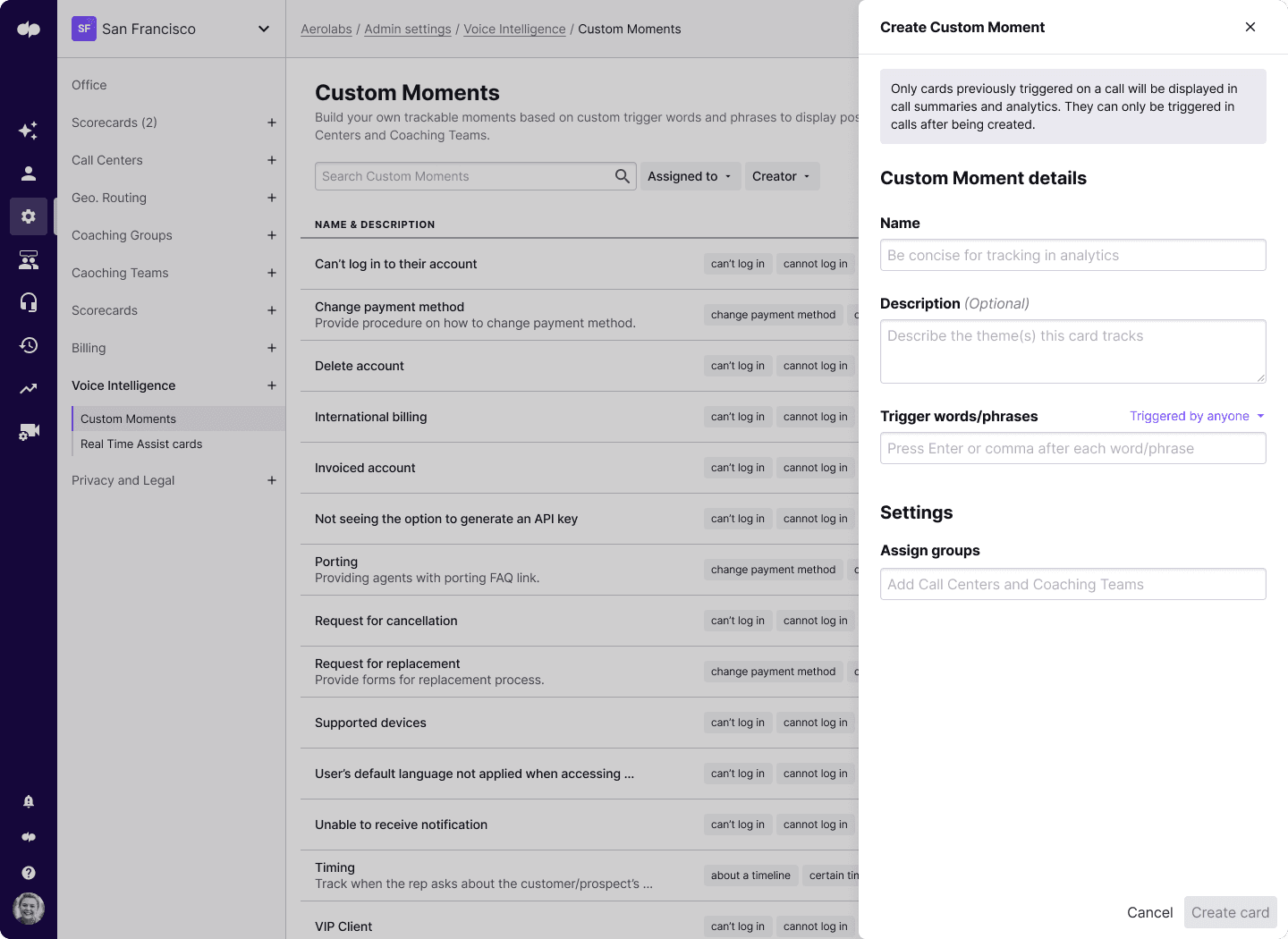
And finally, to help sales reps on the actual calls, Dialpad’s Ai Agent Assist automatically pops up with helpful information and notes when specific trigger words—like “price” or “not looking right now” are spoken:
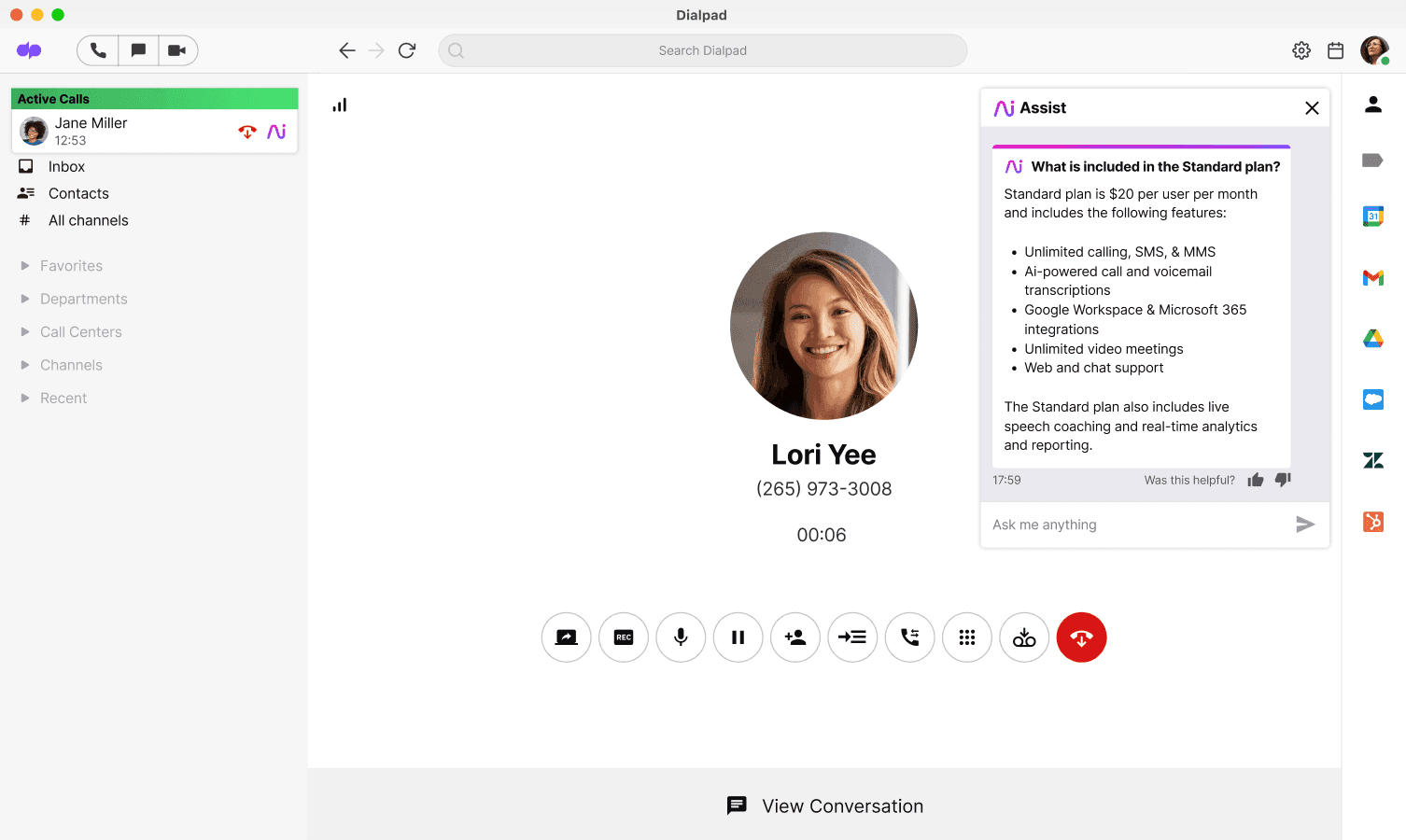
This helps all our reps know exactly what to say and how to counter different objections effectively—without our coaches having to sit in on every call.
Pricing: Dialpad Ai Sales starts at $60 per user per month, which includes AI features like real-time transcription and Ai Moments.
2. InsideSales (formerly Xant)
Key features: AI lead scoring and prioritization, data enrichment
Pricing: You’ll have to reach out to the InsideSales team.1
3. ZoomInfo (formerly Chorus.ai)
Key features: Conversation intelligence, call transcription, and AI-powered insights
Pricing: You’ll have to reach out to ZoomInfo’s sales team.2
4. Outreach.io
Key features: AI outreach tools for email like scheduling, sequencing, and templates
Pricing: You’ll have to reach out to Outreach’s team.3
5. HubSpot Sales Hub
Key features: AI-powered content generation, email writing
Pricing: HubSpot Sales Hub pricing starts at about $85 per user per month.4
6. VanillaSoft
Key features: AI-driven sales engagement platform, lead routing, and real-time analytics
Pricing: You’ll have to reach out to VanillaSoft’s team.5
7. Cognism
Key features: AI-powered B2B lead generation, lead enrichment, and sales intelligence
Pricing: You’ll have to reach out to Cognism’s team.6
8. Clari
Key features: AI-powered revenue operations platform, sales forecasting, and pipeline management
Pricing: You’ll have to reach out to Clari’s team.7
9. Fireflies.ai
Key features: Call recording, AI-powered transcription and summaries
Pricing: Tiers start at a free plan, but it comes with only 800 minutes of storage per seat, which is enough for about 13 one-hour calls.
How to automate cold calls effectively in 5 steps
Now, let’s look at how to automate cold calls.
1. Identify target prospects
AI can streamline the process of identifying target prospects for cold calling by analyzing data like customer demographics and purchase history to uncover patterns and insights that indicate potential interest or readiness to purchase. These insights help you create highly targeted prospect lists for cold calling.
2. Develop a script
AI can also generate cold calling scripts by analyzing past transcripts and data of successful calls to identify keywords or patterns that may have come up often in successful cold calls.
3. Use an AI calling platform (like Dialpad)
Implementing an AI-powered calling platform can seriously streamline the cold calling process. For example, Dialpad comes with a sales dialer, which reduces manual effort and increases the number of calls your team can make.
It also has AI transcription and coaching and performance review features like Ai Scorecards, which can instantly suggest if reps are following your cold calling playbook.
4. Personalize interactions
AI can help personalize cold calling interactions by analyzing data on individual prospects to suggest content or messaging tailored to their preferences and needs.
5. Track and analyze results
As we mentioned earlier, AI can transcribe calls and extract key insights such as sentiment, keywords, and common objections, which makes it easier to identify patterns in successful calls versus unsuccessful ones, providing actionable feedback on what strategies work best.
For example, we use Dialpad's Ai Scorecards to quickly review calls and see if reps did everything listed on the scorecard criteria according to our sales methodology:
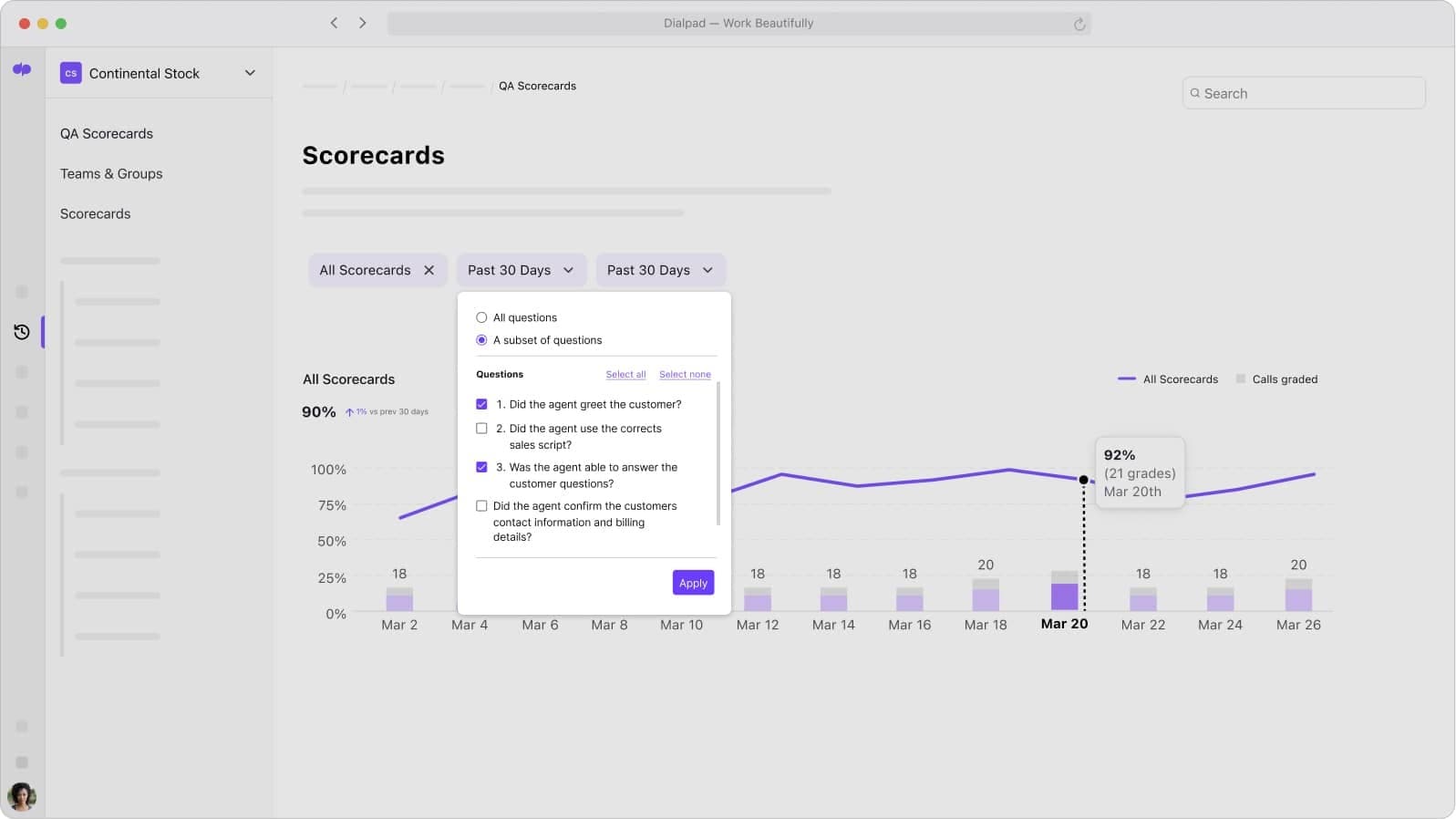
Challenges and considerations with AI cold calling
While AI cold calling offers numerous benefits, there are also challenges to consider, like:
Data privacy: Ensure compliance with data privacy regulations.
Initial setup costs: Be prepared for potential upfront investment.
Continuous monitoring needed: Regularly monitor AI performance and make adjustments based on evolving compliance and data security needs.
What does the future hold for AI cold calling?
The future of AI cold calling looks promising, with advancements in AI technologies expected to continue improving personalization, efficiency, and effectiveness.
As AI continues to evolve, it’ll likely play an even more critical role in outbound sales teams.
Enhance cold calling with Dialpad’s AI-powered platform
AI cold calling is revolutionizing the sales landscape by automating tasks, enhancing personalization, and providing valuable insights. By leveraging AI, sales teams can significantly improve their outreach efforts, drive pipeline growth, and achieve higher conversion rates. Embrace the future of sales with AI cold calling and stay ahead of the competition.
By integrating these practices and tools, your organization can effectively utilize AI cold calling to transform your sales process and achieve unprecedented success.
FAQs about AI cold calling
1resources.insidesales.com/pricing/
2zoominfo.com/pricing
3outreach.io/pricing
4hubspot.com/pricing/sales/enterprise
5vanillasoft.com/product/pricing
6cognism.com/pricing
7clari.com/pricing/








